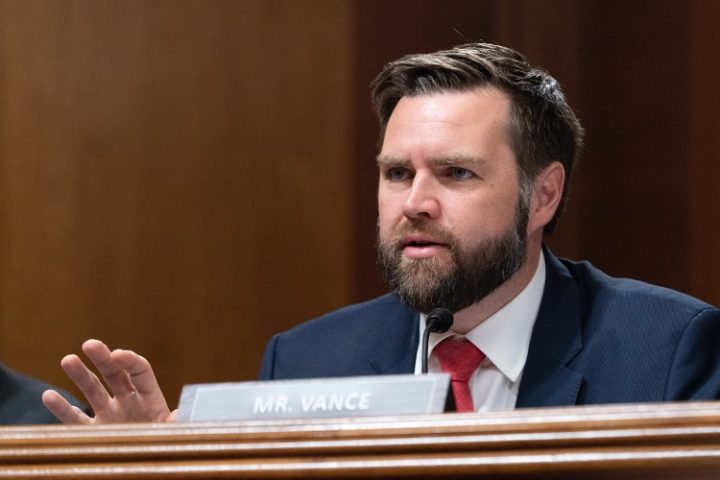
In the face of an ideologically belligerent White House, congressional Republicans are brainstorming ways to compel the administration to enforce the law.
On Tuesday, Senator J.D. Vance (R-Ohio) and Representative Jim Banks (R-Ind.) rolled out a proposal that would create a special inspector general’s office for the purpose of investigating discrimination in college admissions — a way of enforcing the Supreme Court’s ban on affirmative action in spite of the reluctance from the liberal Biden administration.
Titled the College Admissions Accountability Act, the plan would place the new inspector general within the Education Department — separating the post from the Office of Civil Rights. The aim would be to look into possible violations of the colorblind standard which the court established in Students for Fair Admissions v. Harvard, in which a Supreme Court majority ruled that affirmative action admissions based on race are a violation of the 14th Amendment.
Vance told the Washington Free Beacon, “Every student in America is entitled to equal protection under the law, regardless of their background. This bill creates the means necessary to enforce the Court’s decision and hold colleges and universities accountable for illegal discrimination on the basis of race.”
The outlet reports:
The bill would create a new mechanism for applicants and university employees to file discrimination claims against admissions departments. Those claims would be investigated by the special inspector general — nominated by the president and confirmed by the Senate — who could then recommend enforcement actions, including the revocation of federal funds, to the secretary of education and attorney general.
The office would also submit quarterly reports to Congress on the allegations it has received and what corrective steps have been taken. That means the secretary of education and attorney general, while theoretically free to ignore the office’s recommendations, would face public pressure to lay down the law.
Universities, many of which have left-leaning administrations, have been trying to find work-arounds to the Supreme Court ruling. For example, some schools have updated their admissions essay prompts to focus more on identity and race (even though the Supreme Court explicitly said they cannot do this).
Columbia University, the prestigious New York-based Ivy League school, came up with the idea of requiring short video statements from applicants, although it eventually abandoned the idea under public scrutiny when it was pointed out that admissions officials could use the visual to zero in on students’ race.
The proposed legislation from Vance and Banks would extend to “financial aid determinations” and “academic programs,” meaning the inspector general would have authority to take action on scholarships, fellowships, and research programs.
Backers of the bill argue that the new position is necessary because the Education Department’s Office for Civil Rights, which is supposed to be the entity responsible for ensuring colleges are compliant with nondiscrimination law, has been unwilling to resolve discrimination cases, displaying a pro-affirmative action agenda.
Mark Perry, an economist at the American Enterprise Institute who has filed more than 800 complaints in cases where institutions are favoring one race or sex over the other, said that the Office for Civil Rights “will accept the most minor, superficial, disingenuous changes,” meaning that colleges “universities can continue to discriminate year after year.”
In one instance, Perry related the antics of a girls-only coding camp, “Girls < RUN>:\THE\ WORLD,” at the University of Minnesota, Twin Cities. While the Office for Civil Rights instructed the camp to add a disclaimer saying the camp would be open to students of all sexes, promotional materials and the website were allowed to stay the same, thus keeping the public from learning that boys would also be allowed to attend the coding program.
Co-sponsors of the bill are Senators Ted Budd (R-N.C.), Mike Braun (R-Ind.), Josh Hawley (R-Mo.), Eric Schmitt (R-Mo.), and Marco Rubio (R-Fla.). The plan included a sunset clause doing away with the office after 12 years on the grounds that it is sufficient time for universities to implement long-term changes in accordance with the Supreme Court’s ruling. The bill appropriates $25 million for the new inspector general.
“Universities should accept students based on merit and achievement, not the color of their skin. Race based admissions have divided our country further and we must pull the plug on this unjust social engineering once and for all,” Banks said in a statement. “Senator Vance and my bill would force universities to start respecting basic American principles and to stop discriminating against applicants based on their immutable traits.”
During a committee hearing on Wednesday, Vance questioned bank CEOs regarding their commitments to enforcing diversity, equity, and inclusion practices in the financial sector.
The Left has long been accustomed to spreading its agenda via the universities and progressive corporations, using their power to discriminate against conservatives in academia and blocking their access to financial services. But it appears congressional Republicans are telling the heads of these institutions that the days of suppressing conservatives are over.
Better yet would be for the government to get out of education completely. The U.S. Constitution gives no authority to the federal government to fund or regulate education on any level, including colleges and universities. Federal funding — including via federal student loan programs — always comes with strings attached, and has in large part contributed to the massive increase in costs and bureaucratic bloat in the American university system over the last few decades.




